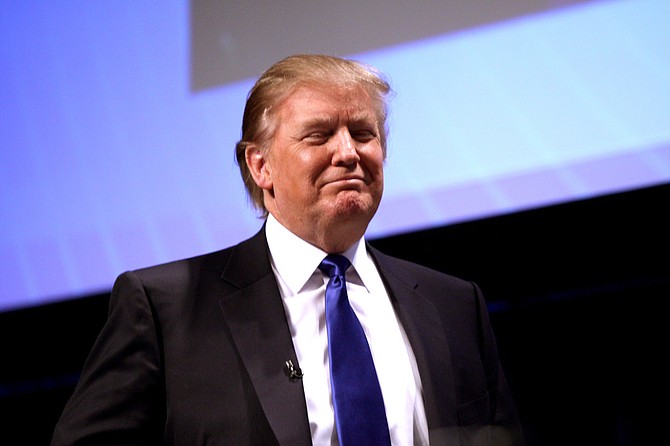Having accused Iran of flouting the nuclear deal, President Donald Trump was inclined to tell Congress that Tehran was violating it. His national security aides talked him out of it, but only after agreeing to last-minute changes to try to distance Trump further from the pact his predecessor struck, administration officials said Tuesday. Photo courtesy Flickr/Gage Skidmore
WASHINGTON (AP) — Having accused Iran of flouting the nuclear deal, President Donald Trump was inclined to tell Congress that Tehran was violating it. His national security aides talked him out of it, but only after agreeing to last-minute changes to try to distance Trump further from the pact his predecessor struck, administration officials said Tuesday.
Rather than say, as planned, that Iran was living up to its end of the deal, Trump's aides found a way to let the deal continue for now without technically confirming that Iran is complying. His administration paired the announcement with new, non-nuclear sanctions on Iranians to show he was indeed serious about confronting Tehran.
The compromise, relayed to Congress in the final few hours before a midnight deadline, lets Iran continue enjoying relief — for now — from nuclear sanctions lifted as part of the 2015 deal. It also gives Trump some cover to declare publicly that Iran is violating "the spirit" of the deal, preserving a potent argument should he ultimately decide to exit the pact.
The deadline comes up again in three months. Given Trump's strong reluctance to certify Iran's compliance, it's highly unlikely he will agree to do it again, officials and others familiar with Trump's Iran policy said. The individuals weren't authorized to comment publicly and requested anonymity.
Coupled with the new sanctions, the move raised optimism among critics of the deal that Trump's broader Iran review, expected to conclude in the next few weeks, will mark a major shift in the U.S. approach to the Islamic Republic.
"What that really foreshadows is once the policy review is done, we're going to see a massive increase in pressure — not just sanctions pressure but using all instruments of American power," said Mark Dubowitz, who runs the hawkish Foundation for Defense of Democracies and has advised the administration on Iran.
The drama came to a head Monday when Trump abruptly put the certification on hold, even as his administration had already started announcing it.
Top advisers rushed to the Oval Office, with Secretary of State Rex Tillerson, Defense Secretary Jim Mattis and national security adviser H.R. McMaster urging him to preserve the status quo — at least until the Iran review is completed and a new U.S policy ready to be unveiled. Steve Bannon, Trump's chief strategist and an avowed critic of the deal, and CIA Director Mike Pompeo urged Trump to change course and say Iran wasn't complying, several individuals briefed on the meeting said.
The argument that ultimately won out: Letting Iran keeps its sanctions relief — thus fulfilling U.S. obligations under the deal — without using the word "complying." Trump and other critics have pointed to minor infractions by Tehran to say it's in violation of restrictions on its nuclear development, although the International Atomic Energy Agency that monitors the deal says Iran is broadly complying.
The compromise led to a last-minute shift in the language Trump's administration employed to describe its actions on the Iran deal.
In an original version of a public statement, prepared by the administration in advance of Monday's announcement and obtained by The Associated Press, the State Department planned to say the U.S. "is certifying Iran's continued compliance with the JCPOA" — an acronym for the nuclear deal — "while noting Iran's continued malign activities outside the nuclear issue."
In the final language sent to Congress and echoed later by the State Department, the administration said only that it was certifying that "the conditions ... are met" when it comes to a separate, U.S. law put in place to monitor the nuclear deal.
In practice, the compromise accomplishes the same as what Trump's earlier, April certification did: Iran continues to receive relief from nuclear sanctions in exchange for rolling back its nuclear program. But the shift in rhetoric helps bolster Trump's position that Iran is defying a deal that's bad to begin with and must be corrected.
"The administration is continuing to conduct a full review of U.S. policy toward Iran," said State Department spokeswoman Heather Nauert. "During the course of this review, the United States will continue to aggressively counter Iran's malign activities in the region."
The latest attempt to clamp down on Iran's military financing, the new sanctions announced Tuesday hit 18 Iranian individuals and groups. They range from an Iranian-based company accused of aiding the country's drone program to a Turkey-based provider of naval equipment and a China-based network that helped secure electronics for Tehran.
Iran has bristled at new U.S. sanctions, arguing that they, too, violate the spirit of the deal. On Tuesday, Iranian lawmakers agreed to fast-track an anti-American bill meant to confront what Iran calls "adventurist and terrorist" U.S. actions in the region
The Iran deal, reached by former President Barack Obama and other world leaders, doesn't address global concerns about non-nuclear activities, but also doesn't prevent the U.S. and others from punishing Iran for those activities.
"This administration will continue to aggressively target Iran's malign activity, including their ongoing state support of terrorism, ballistic missile program, and human rights abuses," said Treasury Secretary Steven Mnuchin.
Copyright Associated Press. All rights reserved. This material may not be published, broadcast, rewritten, or redistributed.



Comments
Use the comment form below to begin a discussion about this content.